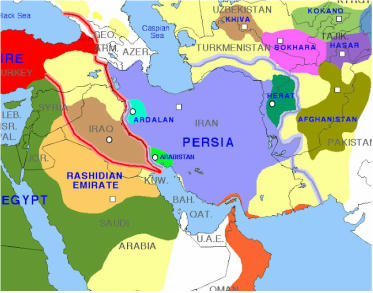The Baha'i faith began in the early 19th century in Persia (modern day Iran) with the Babi
movement, founded by Ali-Muhammad of Shiraz, a merchant who declared himself a divine messenger in 1844. He called himself the Bab because he claimed he was the gate to the hidden imam, a messianic figure expected by the Shiites. The Bab was imprisoned for his teachings and was executed by a firing squad.
Before his death, the Bab appointed Mirza Husayn-Ali of Nur, who took the name of Baha'ullah ("Glory of God" in Arabic). He spread Babi beliefs throughout Northern Islam and protected Babi leaders from persecution through his court connections when he was able to. A mass persecution of Babis sparked when two young Babis attempted to assassinate the king, resulting in Baha'ullah's imprisonment. When he was released from prison, he was permanently exiled from Iran and moved to Baghdad, where he spread the religion.
Baha'ullah launched his prime ministry in 1863, declaring himself as a divine messenger and head of the Baha'i faith. 10 years later, he revealed the Kitab-i-Aqdas, or Most Holy Book, the central book of the Baha'i faith. He died in Acre, Israel in 1892, leaving 'Abdul'i'-Baha as the head of the religion. When 'Abdul'i'-Baha died in 1921, his will specified that Shoghi Effendi would be appointed head of the Baha'i faith. He focused on shifting the Baha'i community to a more formal organization.
Before his death, the Bab appointed Mirza Husayn-Ali of Nur, who took the name of Baha'ullah ("Glory of God" in Arabic). He spread Babi beliefs throughout Northern Islam and protected Babi leaders from persecution through his court connections when he was able to. A mass persecution of Babis sparked when two young Babis attempted to assassinate the king, resulting in Baha'ullah's imprisonment. When he was released from prison, he was permanently exiled from Iran and moved to Baghdad, where he spread the religion.
Baha'ullah launched his prime ministry in 1863, declaring himself as a divine messenger and head of the Baha'i faith. 10 years later, he revealed the Kitab-i-Aqdas, or Most Holy Book, the central book of the Baha'i faith. He died in Acre, Israel in 1892, leaving 'Abdul'i'-Baha as the head of the religion. When 'Abdul'i'-Baha died in 1921, his will specified that Shoghi Effendi would be appointed head of the Baha'i faith. He focused on shifting the Baha'i community to a more formal organization.








0 نظرات:
ارسال یک نظر